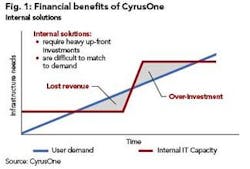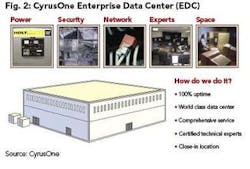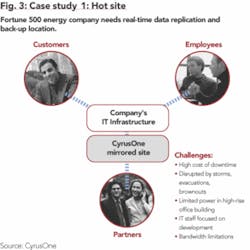Outsourcing IT could help cut costs, while improving reliability, security
Blake McLane, vice president of sales at CyrusOne, leaned forward in his chair and explained that his initial contact with a company is usually through its CFO because the internal information technology people at a firm frequently see him as a threat - at first.
Therefore, his marketing efforts target the highest executive level - CEOs, COOs, and CFOs - because he knows these individuals are more concerned with fiduciary responsibility to the company’s stakeholders rather than job preservation.
When a “C-level” executive directs the IT department to look into the feasibility of outsourcing certain in-house functions, McLane knows they will be given an opportunity to present their case. When they do, he says, the IT department head soon realizes the potential threat is actually a chance to show senior management how his department can be more cost effective while providing improved services.
McLane says there are two primary reasons for talking to a company like CyrusOne, a Houston-based full-service data center that provides managed hosting, co-location, and enterprise management services to a variety of clients, including some in the energy industry: 1) to reduce capital expenditures on non-core technology; and 2) to improve reliability and security of critical systems and data.
Like several other full-service IT providers, CyrusOne provides customers with more than just a secure facility (Fig. 2) to house their critical business applications. Generally, the customized services that CyrusOne provides are around the IT infrastructure - the system and network operations management, remote monitoring, storage, and backup solutions.
Two outsourcing models exist, says McLane: one in which all IT is outsourced to a specific vendor that assumes responsibility for all areas of IT and another in which only a specific area is outsourced. It’s the latter that is gaining ground among small- and medium-sized enterprises (SMEs), he adds.
Origins of outsourcing
Outsourcing began as a way for companies to cut costs and gain access to expertise that was not available internally. By delegating parts of certain business processes to outside vendors, management was able to devote more time to core activities. This system is in wide use today and can be an effective tool to improve overall productivity.
During the past decade, outsourcing has helped transform the corporation, says the Outsourcing Institute, a professional association of more than 48,000 executives, practitioners, and experts in the outsourcing industry. Leading the charge has been IT, which is broadly defined as a collection of technology services that permeates every department of a company.
IT outsourcing is playing a leading role in the overall outsourcing “revolution,” says the institute. Spending on IT outsourcing reached $56 billion in 2000 and is expected to top $100 billion this year. IT outsourcing accounts for nearly 63 percent of all outsourcing revenue, according to a recent study by Gartner Inc., a Stamford, Conn.-based provider of research and analysis on the global IT industry.
Why such heavy spending? Many companies, especially SMEs, are choosing to outsource all or a portion of their IT infrastructure support in order to concentrate on their core business. IT is complex and capital intensive and can take the focus off such core issues as competition and improving profits.
Schlumberger partnership
Even larger enterprises, such as oil services giant Schlumberger, which had more than $10 billion in operating revenue in 2003, are partnering with IT service providers to enhance their technology infrastructure as well as reduce capital expenditures on IT.
Last October, Schlumberger Information Solutions (SIS) signed an agreement with CyrusOne to expand its current computing infrastructure to include Tier 1 data center space. Tier 1 is the highest level of security, power, connectivity, and monitoring infrastructure available.
The contract includes systems and network operations management for availability, business continuity, and disaster recovery, backed by a 100 percent availability and security guarantee for critical client-hosted applications.
An operating unit of Schlumberger, SIS provides information solutions and capabilities designed to support oil and gas industry core operational processes through its four organizational segments - software technologies, information management, infrastructure services, and business consulting.
Don Domeracki, SIS business manager for North and South America, commented, “As the industry’s demand for secure, reliable, and flexible computing increases, our partnership with CyrusOne positions SIS to provide more flexible cost-effective, secure computing solutions to our customers.”
CyrusOne’s McLane added, “Combining the depth and breadth of services offered by both organizations addresses the ever-changing and demanding technology requirements of the oil and gas industry. We are confident the complimentary offerings from SIS and CyrusOne will allow our clients to focus on and improve their core operational processes.”
Other CyrusOne clients in the energy industry include Enbridge Energy Company Inc., which operates the world’s longest crude oil and liquids pipeline; the Petroleum Equipment Suppliers Association (PESA), a group of equipment manufacturers, wellsite service companies, and supply companies serving oil and gas drillers and producers; and Dynegy Inc., which provides electricity, natural gas, and natural gas liquids to wholesale customers throughout the US.
Last year, Dynegy elected to extend its two-year agreement with CyrusOne for another five years. Under terms of the contract, CyrusOne provides a secure and redundant facility to meet Dynegy’s hosting and business continuity needs.
The Houston IT department at Enbridge faced several challenges, including the assimilation of new and legacy systems, deciding which to keep, and migrating them to the company’s existing network, all while maintaining a smooth operation for their current users.
Pete Rake, manager of infrastructure and SCADA operations at Enbridge, said, “As we’ve captured greater market share over the last couple of years, our connectivity demands have grown at an exponential rate. We wanted a partner that could help us continue to expand without having to tie up capital in infrastructure.”
Rake added that CyrusOne was able to deliver a comprehensive turnkey solution tailored to their specific requirements and freed the IT department at Enbridge from managing a host of disparate details.
North American IT providers
Other data centers in North America that provide services similar to those of Houston’s CyrusOne include (i)Structure in Broomfield, Colo.; Canada’s Q9 Networks; Tulsa-based Data3 Corporation; External iT, headquartered in New York City; and Ashburn, Va.-based SevenSpace, a privately held company acquired by Sun Microsystems Inc. in 2004.
Forrester Research, an independent technology research company based in Cambridge, Mass., recently named (i)Structure the industry leader in IT outsourcing. The company, with 17 years’ of outsourcing experience, touts its “explicit, predictable service costs” and its ability to stay ahead of changing technology cycles. In addition to its Denver-area headquarters, (i)Structure has branch locations in Omaha, Neb., and Tempe, Ariz.
Q9 Networks, with data centers in Toronto and Calgary, provides outsourced internet infrastructure and managed hosting services for companies with mission-critical internet operations. The company guarantees 100 percent network and power availability and reports a 35 percent increase in revenue in 2004 over the previous year.
Data3 is a Tulsa-owned and operated company that specializes in mobile data collection, application development, and managed services and security. The company’s managed hosting allows for the storage of mission-critical data and information in an off-site location in the event a primary location is damaged by fire or other disasters. Data3 promises “zero downtime, which means continuous availability even in the event of unforeseen disaster, ensuring continued company revenue, productivity, and customer satisfaction.”
External iT offers to host your entire IT operation or just a single application. The New York firm suggests that companies consider not buying and maintaining servers and other equipment and that instead of hiring IT staff and consultants, that you leave everything to them. External iT, in effect, becomes your IT department.
You’ll never have to restore from back-up, protect your data from intruders, clean up damage caused by a rogue virus, worry about a sick employee who can’t log in from home, or be concerned with users wasting time figuring out how to correctly use their software, says the company, which lists several major law offices and accounting firms among their clients.
SevenSpace, based in the Washington, DC, area, says it delivers remote system monitoring and management with “high levels of operational efficiency and committed service levels.” The company offers what it calls “innovative IT outsourcing” that ranges from hiring an internal staff of IT experts to outsourcing the complete management of their applications and infrastructure. As a middle ground, the company provides a selective outsourcing solution aimed at “augmenting the overall efficiency of IT departments without sacrificing control.”
SevenSpace has additional locations in Chicago and Irvine, Calif., and boasts 145 clients, including CVS/Pharmacy, The Carlyle Group, and New Jersey Transit.
Flying under the radar
Because of security concerns, many data centers avoid publicity and do not advertise or promote their services. For similar reasons, their clients often ask that their names not be used in news releases. Consequently, these types of IT providers often maintain a low profile in the communities they serve and are frequently “off the radar screen” even to neighboring businesses.
Building a secure, reliable IT infrastructure requires a long-term commitment and a heavy up-front investment, says CyrusOne’s McLane. Many of their clients have grown weary of spending precious capital to build and maintain IT infrastructure - money that might otherwise be spent on expanding their core business.
In today’s competitive business environment, the IT department can be a drag on a firm’s earnings. If your main purpose is to extract oil from the ground, you don’t want to divert funds unnecessarily for non-core functions, he says. (Fig.1)
“It’s a continuing challenge to match IT capacity with the fluctuating demands of today’s face-paced environment,” says McLane. “And there are other considerations, such as the exhaustive task of recruiting, training, and retaining outstanding technical talent, and the increased risk posed by unpredictable support costs.”
By retaining an outside firm to deliver IT services and support on demand, a company is able to eliminate revenue losses associated with under-investment in IT as well as smooth out the peaks and valleys of requirement levels that may vary from week to week and even day to day.
Outsourcing financial functions
The outsourcing of non-core business functions has become increasingly popular with both US and European multinational companies. A recent survey of 151 American CFOs and 127 of their European counterparts by PricewaterhouseCoopers showed that approximately 75 percent of the multinationals use outsourcing for their financial functions, although only three percent say it saves them a substantial amount. Another 44 percent say it saves them a moderate amount, and about nine percent say they “break even.”
Regardless of the cost savings, 60 percent of the companies surveyed say they see financial outsourcing as a key to profitable growth.
Accounts payable, billing, and payroll are the functions most commonly outsourced, with benefits ands claims administration a close second. Tax services, systems support, internal auditing, and compliance are also frequently outsourced.
Thirty-two percent, nearly a third, of the CFOs say they outsource their risk management functions.
Although 40 percent of the companies surveyed were “less than satisfied” with the cost savings of outsourcing, more than half say that data security, control, compliance issues, and timeliness of output make financial outsourcing worthwhile.
On-demand model
IBM Global Services has written a white paper on outsourcing IT which defines that company’s on-demand model for IT solutions. The IBM paper presents the case for outsourcing: “Many companies are realizing that if IT is truly going to support their strategic business objectives, they need a way to easily manage their technology. The concept of on-demand outsourcing allows corporate executives and IT personnel to not only consolidate and integrate their systems, but also simplify IT management and reduce costs.”
IBM emphasizes that while this new phase of outsourcing is still evolving, “The idea of implementing an outsourced on-demand utility solutions that permits pooling IT resources company-wide, and an ability to track usage on a per-business-unit basis, is highly appealing to companies looking to substantially reduce total cost of ownership.”
Companies such as IBM have found it advantageous to market their on-demand outsourcing capability to IT departments that are struggling with inflexible legacy systems that have become outdated or companies facing IT budget reductions that make rapid change and market adaptability virtually impossible. Such outsourcing can be easily customized to meet individual customer requirements.
Frank Casale, founder and CEO of the Outsourcing Institute, noted that “Clients want more than just consulting or outsourcing. They need a partner who can work with them to deliver transformational change, and they are demanding greater accountability from their partners. This is a value that goes beyond simple cost savings.”
The biggest challenge for the IT outsourcing industry is “building awareness and educating our target audience,” he adds.




